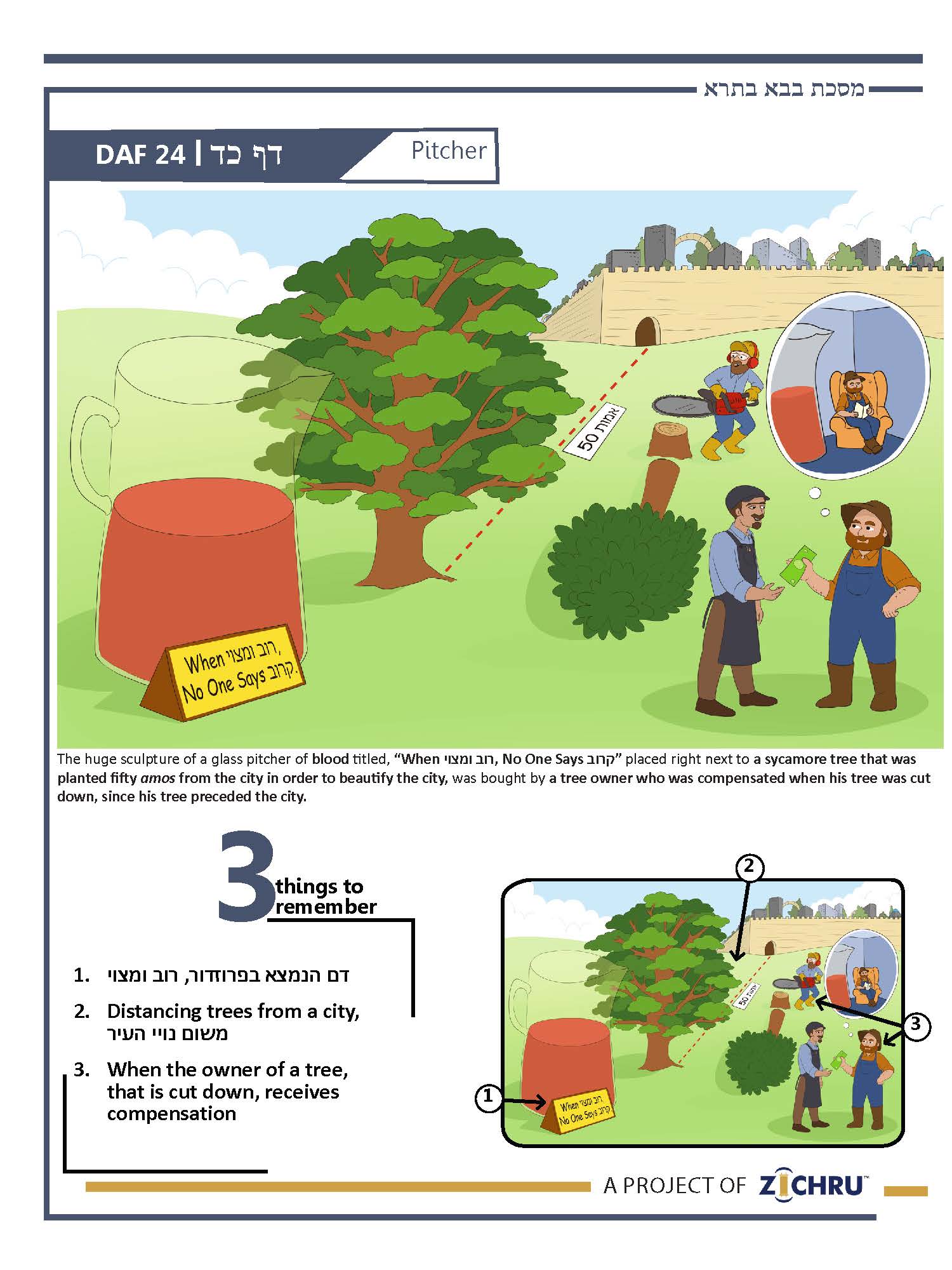Bava Basra - Daf 24
- Audio Timestamps
0:00 - The 3 Sugyos
2:49 - Review of 3 Sugyos
5:30- Siman
8:02 - 4 Blatt Back Chazarah
16:42 - Pop Quiz (Last 7 blatt)
For access to all Zichru resources including PDFs, and illustrations CLICK HERE.
- דם הנמצא בפרוזדור, רוב ומצוי
Abaye presents a Mishnah to prove Rebbe Chanina’s ruling that רוב overrides קרוב: דם שנמצא בפרוזדור – if blood was found in the canal of a woman’s body, ספיקו טמא – its unknown status is ruled definitely tamei (i.e., she is a definite niddah), שחזקתו מן המקור – because it is assumed to have originated from the uterus, and not the עלייה – “upper chamber.” Despite the fact the עלייה is physically closer to the פרוזדור, the blood is still assumed to be from the מקור, because more blood comes from the מקור. This proves that רוב is stronger than קרוב!? Rava answers: רוב ומצוי קא אמרת – you speak about a case which is both majority and frequent? [Not only is there more blood in the מקור, but blood commonly flows from the מקור to the פרוזדור, but not from the עלייה.] רוב ומצוי ליכא למאן דאמר – In a case where both רוב and frequency oppose קרוב, no one says to follow קרוב.
- Distancing trees from a city, משום נויי העיר
The next Mishnah states: מרחיקין את האילן מן העיר עשרים וחמש אמה – one must distance a tree twenty-five amos from a city. A carob or sycamore tree, which have many branches, must be distanced fifty amos. Abba Shaul says all barren trees must be distanced fifty amos. Ulla explains the reason for the Mishnah’s laws: משום נויי העיר – for the city’s beautification. A space of open land enhances the city’s beauty. The Gemara asks that this law is unnecessary, because a Mishnah teaches, regarding the law for a city to have a מגרש (a thousand-amos area surrounding a city reserved as a clearing), and a שדה (the thousand-amos area which surrounds the migrash and is dedicated for planting): אין עושין שדה מגרש – one cannot turn fields into a migrash, or vice versa. Thus, the first thousand amos surrounding the city must be clear anyway!? The Gemara answers that the Mishnah’s law is relevant according to Rebbe Elazar, who holds one may turn a מגרש into a field (and the Torah’s requirements for the design of a city only applies to cities of Leviim). Alternatively, the ban against planting in a מגרש applies only to grain, but not to trees, as the Gemara demonstrates.
- When the owner of a tree, that is cut down, receives compensation
The Mishnah taught that if the city preceded the tree, it is cut down, and the owner of the tree is not compensated. However, if the tree preceded the city, קוצץ ונותן דמים – he must cut it down, and [the city] pays compensation, since it was planted legally. A Mishnah later teaches that a tree that was planted too close to a neighbor’s pit is cut down, but the tree’s owner is compensated. The Gemara explains: שאני הזיקא דרבים מהזיקא דיחיד – the damage to the public is different from the damage to an individual. Although one is required to cut down his tree which harms the public without any compensation, he is not required to do so for an individual. In the Mishnah’s second case, where the tree was planted legally, he must cut it down, and the city must compensate him. The Gemara asks that he should have the right to demand payment before cutting down his tree!? Rav Kahana answers: קידרא דבי שותפי לא חמימא ולא קרירא – a pot of partners is neither hot nor cold because each depends on the other to tend to it. If the tree would only be cut down after he is paid, it would not get cut down, because no one would volunteer to be first to pay.
Siman – Pitcher
The huge sculpture of a glass pitcher of blood titled, “When רוב ומצוי, No One Says קרוב” placed right next to a sycamore tree that was planted fifty amos from the city to beautify the city, was bought by a tree owner who was compensated when his tree was cut down, since his tree preceded the city.


